
Thomas Breen File Photo
Mayor Elicker unveils his fifth proposed budget.
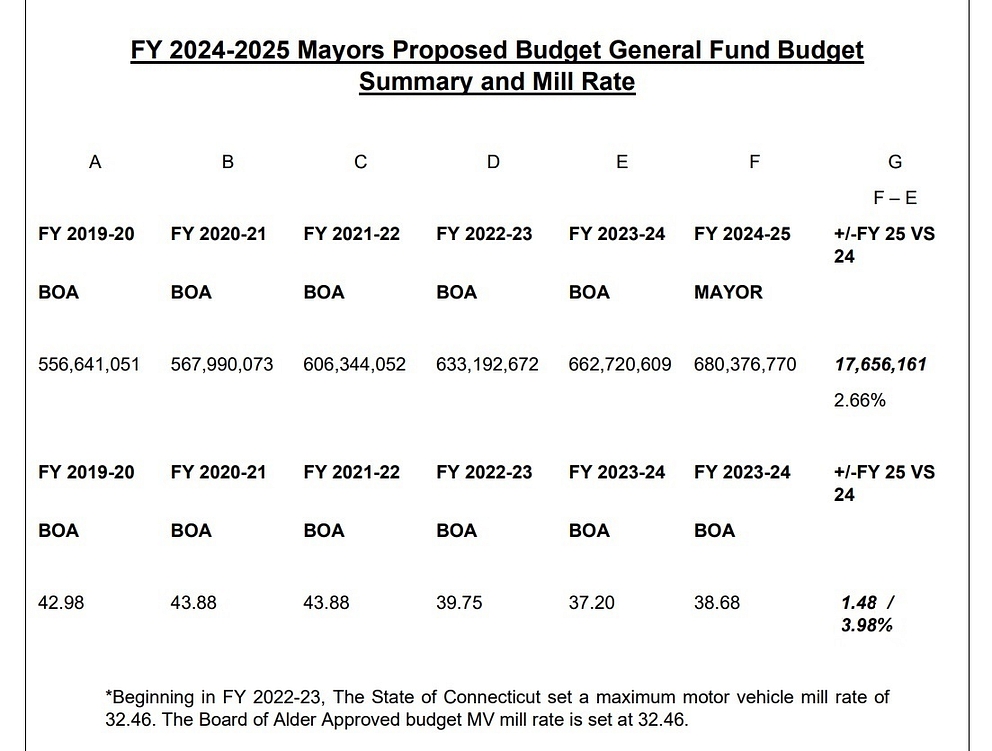
FY25 general fund, mill rate proposals in comparison to previous four years.
Taxes would rise — and city government would reshuffle its approach to inspecting housing and caring for parks — in a new city budget Mayor Justin Elicker proposed Friday.
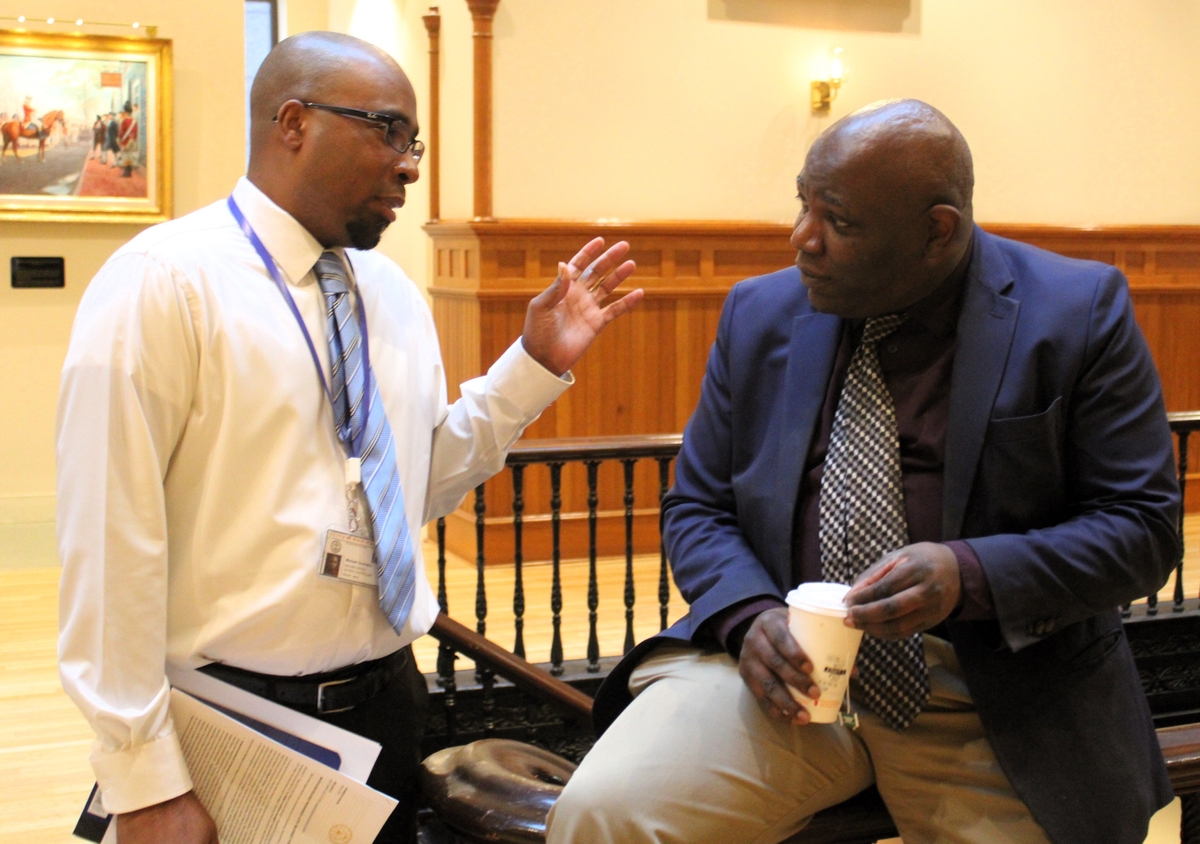
Thomas Breen Photo
City Budget Director Michael Gormany and Director of Legislative Services Al Lucas at Friday's presser.
Elicker introduced that budget during a press conference held on the second floor of City Hall.
The mayor’s general fund budget proposal for Fiscal Year 2024 – 25 (FY25), which begins July 1, weighs in at $680,376,770 in revenue and expenditures.
The fiscal document now heads to the Board of Alders for roughly three months of public hearings, review, and amendments before local legislators take a final vote in late May or early June.
If approved by the full Board of Alders, that would mark a 2.66 percent increase above the current fiscal year’s general fund budget of $662,720,609.
The mill rate — which translates to $1 in local taxes owed for every $1,000 in assessed real estate value — would also rise under Elicker’s latest proposal, from 37.20 to 38.68, or by 3.98 percent.
Why is the mill rate going up at a higher rate than the overall general fund?
While state Payment in Lieu of Taxes (PILOT) and Yale voluntary contributions continue to increase year to year, Elicker told the Independent, the city has seen a drop in other non-property-tax-derived revenue. That includes a $1.6 million drop in what the city expects to receive in state reimbursements for locally capped motor vehicle taxes, a $3.5 million drop in what the city expects to receive through the state Education Cost Sharing (ECS) grant, and a $1.5 million reduction in the city’s assumption of how much money it will bring in from the sale of fixed assets. (See the bottom of this article for a one-page summary of changing revenue assumptions included in this budget.)
The mayor’s FY25 proposed budget would also see real estate tax revenue increase by 4.83 percent, from $276,951,393 to $290,341,182, following year after year of local property tax increases — including amid a surge to the taxable grand list as part of the recent citywide revaluation.
Friday’s budget marked the fifth annual fiscal document Elicker has proposed during his time as mayor, and the first since he began his third two-year term in office earlier this year.
Click here to read the proposed budget in full. Click here to read a 16-page summary of key proposed changes. Click here to watch Friday’s press conference in full.
LCI To Focus Only On Enforcement
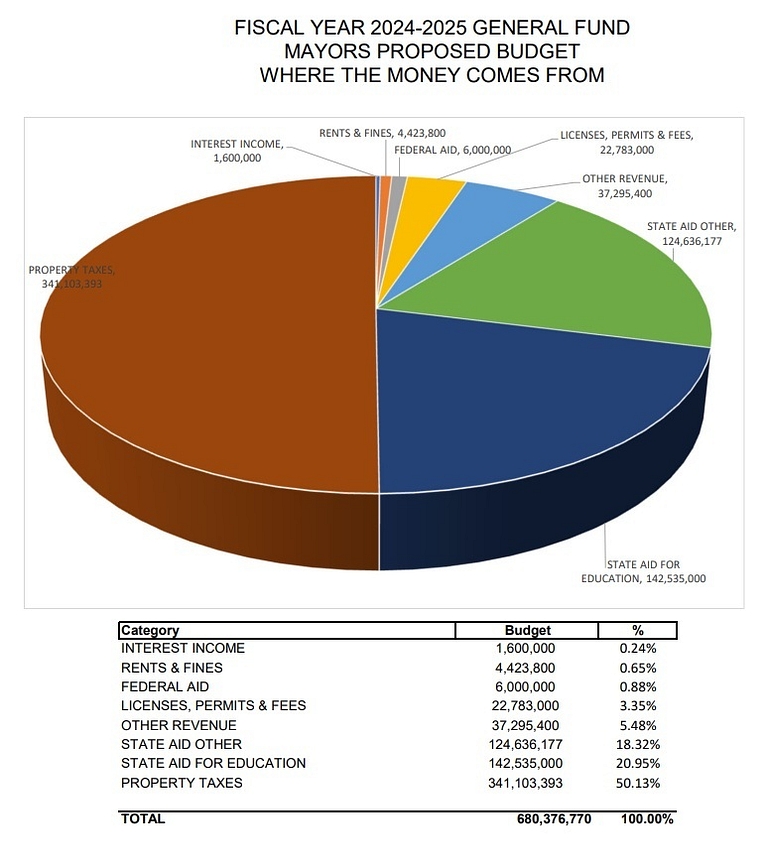
Revenue and expenditure breakdowns in the mayor's FY25 budget.
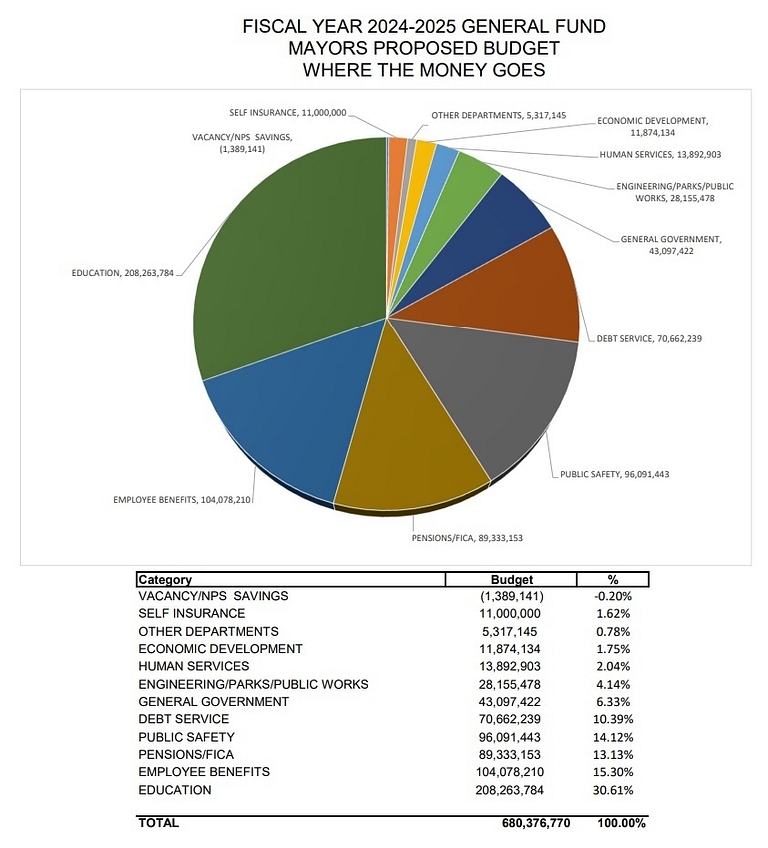
With two dozen department heads and officials in attendance, Elicker stood alongside City Budget Director Michael Gormany as he talked through some of the highlights of his proposed FY25 budget.
Some of the biggest proposed changes represent the unraveling of previous City Hall mergers — along with deeper investments to bolster how those re-split departments function.
On the housing side, Elicker’s proposed budget would move the Livable City Initiative’s (LCI) affordable housing development work to become the purview of a newly created Office of Housing and Community Development. That division would be housed under the Economic Development Administration and overseen by a new to-be-hired city economic development deputy.
This change would free up LCI to focus exclusively on housing code inspection and enforcement.
“We need someone waking up every day that’s focusing on what the original intent of LCI was,” the mayor said, “inspections, housing, rental housing safety, rental housing accountability.”
The mayor’s budget also proposes boosting LCI’s staff by five more city housing code inspectors, bringing that total to 18. It would add a new attorney focused exclusively on housing code enforcement and landlord accountability, and a new LCI administrative assistant.
Making sure that LCI focuses “solely on the enforcement side of things” points back to a time when city government had a separate dedicated neighborhood-focused organization under the purview of the economic development administer, known as Office of Housing and Neighborhood Development. The DeStefano administration created LCI in the 1990s and combined neighborhood housing development with code enforcement. Over the ensuing decades, LCI’s mandate has come to include inspecting rental properties, enforcing the city’s housing code, taking code-defying landlords to court, disposing of empty city-owned “sliver lots,” cleaning up blight, trying to collect from absentee landlords for those costs, and then building two-family homes and selling them at affordable prices to first-time homebuyers. Now, per Mayor Elicker’s proposal, all that housing development work would head to the economic development agency, and LCI would focus exclusively on housing code enforcement.
Parks To Be Unmerged From Public Works
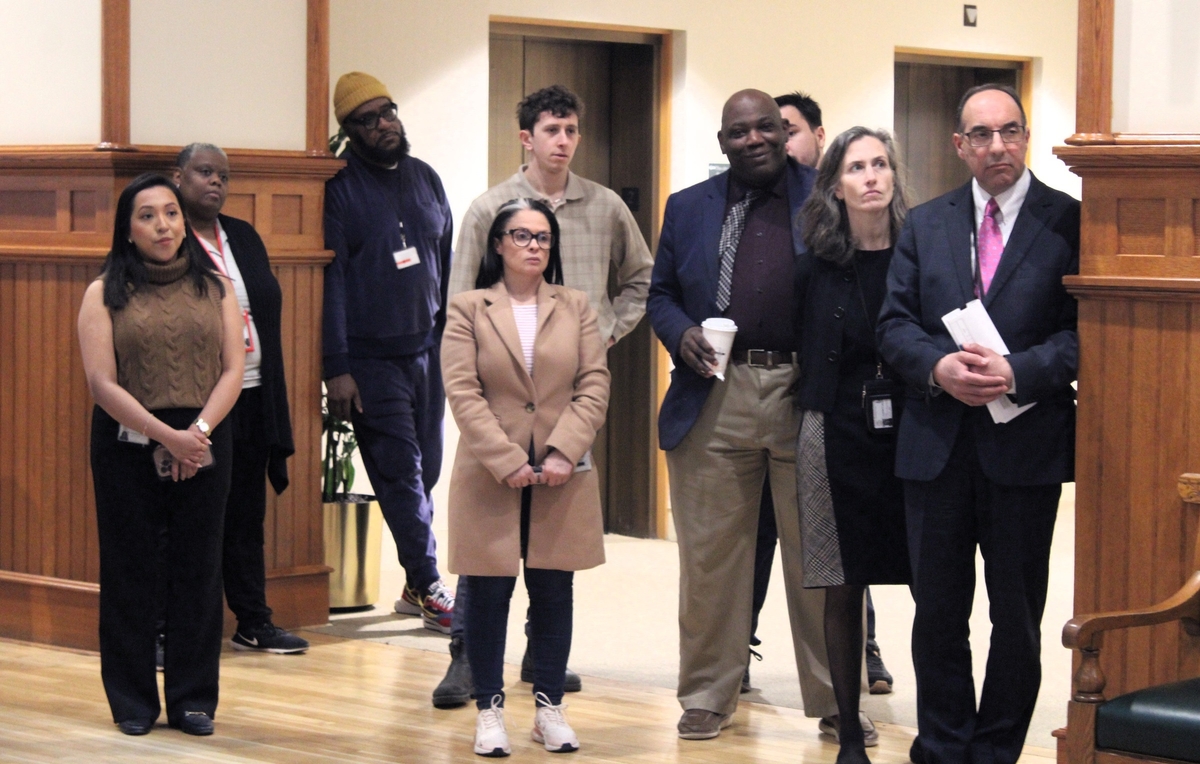
Thomas Breen photo
City officials watch on at Friday's budget unveiling.
Another city department unmerging and bolstering included in Elicker’s FY25 budget proposal concerns the city’s parks. This new budget would create a separate parks department — thereby undoing the city’s merger of the parks and public works departments back in 2020. (That 2020 merger also saw the creation of a newly merged Youth and Recreation Department.)
The proposal follows public protest by citywide parks advocates, parks commissioners, and mayoral challengers for a standalone parks department that better maintains the city’s wealth of cherished public greenspaces. Elicker kicked off a months-long community engagement process led by the Urban Resources Initiative (URI) late last year to find a path back towards a separate — and stronger — parks department.
“We have heard a lot in these past several years from many community members and from many different walks of life about how our parks are one of our most important assets in the city, and the city needs to do better in ensuring that our parks are well maintained, there’s more responsiveness to community needs, [and] the athletic fields are better maintained,” Elicker said on Friday.
In that vein, in addition to splitting parks off from public works again, Elicker’s budget proposes creating three citywide parks districts, each to be helmed by a “district manager,” akin to the model long undertaken by the police department. These parks district managers would go to community management teams and neighborhood meetings, give out their cellphone numbers, and be a direct contact with the public for that district.
Elicker’s budget proposes adding a new superintendent of fields, a parks foreperson, and two “field technicians” to the budget to focus primarily on upkeep for the city’s athletic fields.
“I want to underscore that things cost money,” Elicker said on Friday. “One of the hardest parts of my job is balancing the strong demand for more city service and having a tax rate that is something that residents have the ability to pay for. And that is difficult and challenging work that I struggle with every time I present a budget.”
$5M Bump For Schools; Debt, Pensions Keep Rising
What else is in the proposed budget? Well, a lot more, including:
• 31 new full-time positions in the city’s general fund, according to Gormany and Elicker. Those include a labor relations staff attorney, executive and deputy directors for the new parks department, three new parks district managers, a new police lieutenant and two new police sergeants, and three new fire captains, among others.
• A $5 million increase for the city’s Board of Education, bringing the general fund contribution to the public school system from $203,263,784 to $208,263,784.
• A $1.5 million increase to the city’s debt service, from $69.1 million to $70.6 million, and a $1.2 million increase to the city’s pension contributions, from $88.1 million to $89.3 million.
• A $6 million boost to local revenue from one-time Covid-era American Rescue Plan Act (ARPA) federal aid designated for “public health, economic stabilization and recovery.”
• $30,000 for the New Haven Pride Center.
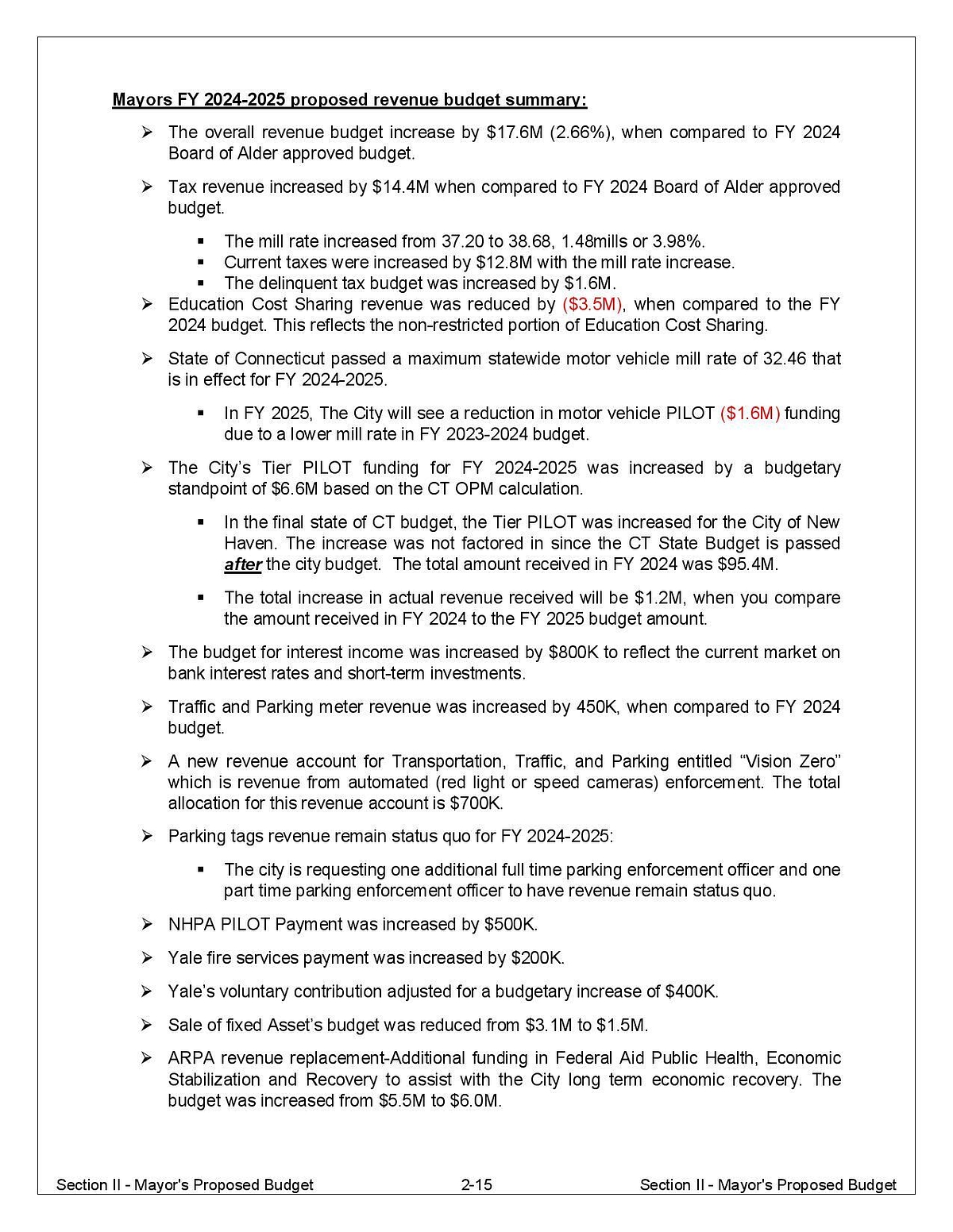
Changing revenue assumptions included in the mayor's FY25 proposed budget.
























The parks in New Haven are a mess and raising taxes will not change that one bit. I walk through Lighthouse Park a few times a week and I can't believe how bad a shape it's in. The city built a new maintenance building which is nice but in a terrible spot. The existing buildings should be torn down and the lighthouse needs to be painted. Fort Hale Park is a drug-infested shit-hole.